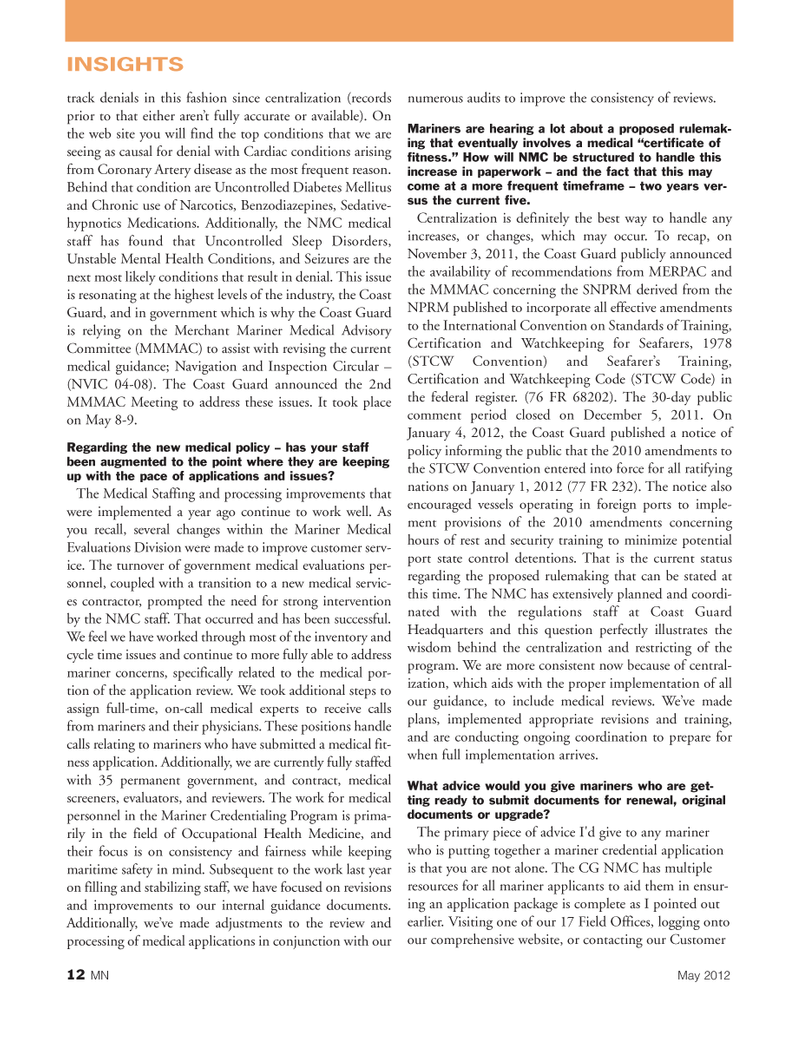
Page 12: of Marine News Magazine (May 2012)
Combat Craft Annual
Read this page in Pdf, Flash or Html5 edition of May 2012 Marine News Magazine
12MNMay 2012INSIGHTStrack denials in this fashion since centralization (records prior to that either aren?t fully accurate or available). On the web site you will find the top conditions that we are seeing as causal for denial with Cardiac conditions arising from Coronary Artery disease as the most frequent reason. Behind that condition are Uncontrolled Diabetes Mellitus and Chronic use of Narcotics, Benzodiazepines, Sedative- hypnotics Medications. Additionally, the NMC medical staff has found that Uncontrolled Sleep Disorders, Unstable Mental Health Conditions, and Seizures are the next most likely conditions that result in denial. This issue is resonating at the highest levels of the industry, the Coast Guard, and in government which is why the Coast Guard is relying on the Merchant Mariner Medical Advisory Committee (MMMAC) to assist with revising the current medical guidance; Navigation and Inspection Circular ? (NVIC 04-08). The Coast Guard announced the 2nd MMMAC Meeting to address these issues. It took place on May 8-9. Regarding the new medical policy ? has your staff been augmented to the point where they are keeping up with the pace of applications and issues?The Medical Staffing and processing improvements that were implemented a year ago continue to work well. As you recall, several changes within the Mariner Medical Evaluations Division were made to improve customer serv- ice. The turnover of government medical evaluations per- sonnel, coupled with a transition to a new medical servic- es contractor, prompted the need for strong intervention by the NMC staff. That occurred and has been successful. We feel we have worked through most of the inventory and cycle time issues and continue to more fully able to address mariner concerns, specifically related to the medical por- tion of the application review. We took additional steps to assign full-time, on-call medical experts to receive calls from mariners and their physicians. These positions handle calls relating to mariners who have submitted a medical fit- ness application. Additionally, we are currently fully staffed with 35 permanent government, and contract, medical screeners, evaluators, and reviewers. The work for medical personnel in the Mariner Credentialing Program is prima- rily in the field of Occupational Health Medicine, and their focus is on consistency and fairness while keepingmaritime safety in mind. Subsequent to the work last year on filling and stabilizing staff, we have focused on revisions and improvements to our internal guidance documents. Additionally, we?ve made adjustments to the review and processing of medical applications in conjunction with our numerous audits to improve the consistency of reviews. Mariners are hearing a lot about a proposed rulemak- ing that eventually involves a medical ?certificate offitness.? How will NMC be structured to handle this increase in paperwork ? and the fact that this may come at a more frequent timeframe ? two years ver- sus the current five. Centralization is definitely the best way to handle anyincreases, or changes, which may occur. To recap, on November 3, 2011, the Coast Guard publicly announced the availability of recommendations from MERPAC and the MMMAC concerning the SNPRM derived from the NPRM published to incorporate all effective amendments to the International Convention on Standards of Training, Certification and Watchkeeping for Seafarers, 1978 (STCW Convention) and Seafarer?s Training, Certification and Watchkeeping Code (STCW Code) in the federal register. (76 FR 68202). The 30-day public comment period closed on December 5, 2011. On January 4, 2012, the Coast Guard published a notice of policy informing the public that the 2010 amendments tothe STCW Convention entered into force for all ratifying nations on January 1, 2012 (77 FR 232). The notice also encouraged vessels operating in foreign ports to imple- ment provisions of the 2010 amendments concerning hours of rest and security training to minimize potential port state control detentions. That is the current status regarding the proposed rulemaking that can be stated at this time. The NMC has extensively planned and coordi- nated with the regulations staff at Coast Guard Headquarters and this question perfectly illustrates the wisdom behind the centralization and restricting of the program. We are more consistent now because of central- ization, which aids with the proper implementation of all our guidance, to include medical reviews. We?ve made plans, implemented appropriate revisions and training, and are conducting ongoing coordination to prepare for when full implementation arrives. What advice would you give mariners who are get- ting ready to submit documents for renewal, original documents or upgrade?The primary piece of advice I'd give to any mariner who is putting together a mariner credential application is that you are not alone. The CG NMC has multiple resources for all mariner applicants to aid them in ensur- ing an application package is complete as I pointed outearlier. Visiting one of our 17 Field Offices, logging onto our comprehensive website, or contacting our Customer MN#5 (1-17):MN 2011 Layouts 5/7/2012 1:05 PM Page 12

 11
11

 13
13
